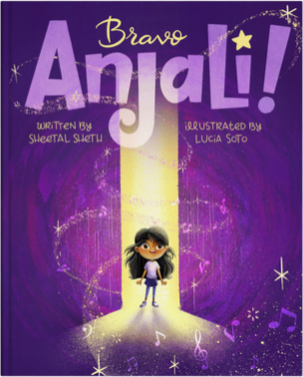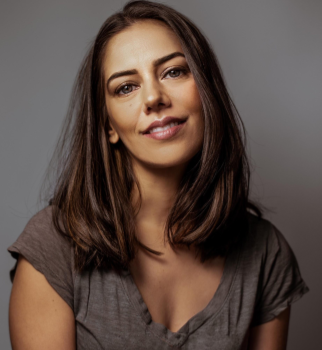Remarkable children’s book encourages young girls to be their best selves
 NEW YORK, NY – Sheetal Sheth returns with a new story for children everywhere featuring Anjali, the first South Asian hero in a children’s illustrated book series.
NEW YORK, NY – Sheetal Sheth returns with a new story for children everywhere featuring Anjali, the first South Asian hero in a children’s illustrated book series.
For Anjali, playing the tabla is something that comes naturally. She loves the feel of the drum beneath her fingers and getting lost in the music. But when the boys in her class give her a hard time for being better than them, she messes up on purpose. When her teacher announces a contest where the winner will get to perform with him at his next concert, Anjali is distraught. Winning the contest would be a dream for Anjali. But it seems like the better she gets, the meaner some of the kids are.
In this follow up to Always Anjali, Anjali realizes that she should never let anyone make her feel bad for being good at something. An important story for all children to remember to never dim their light.
“In this gorgeously rendered tale, our beloved Anjali learns something it took me thirty years to understand: there’s nothing wrong with shining brightly. I will carry the heart of this book with me wherever I go.”
— Nic Stone, #1 New York Times Bestselling author of Dear Martin
“Bravo, Anjali!”
Author: Sheetal Sheth | Illustrator: Lucia Soto
September 21, 2021 | Mango and Marigold Press
Hardcover | 9781737055015 | $19.95
Children’s Illustrated Book
“My kids and I love “Bravo Anjali!” I wish I’d had a book like this when I was a kid. I never saw myself represented in the books I read as a brown girl learning and performing a classical Indian instrument. It’s full of small, sharply observed moments that caught at my heart for how they detail the myriad ways we make ourselves small and silent. I wanted to cheer for Anjali as she let her light shine in all its glory.”
— Anoushka Shankar- Sitarist, composer
 More about SHEETAL SHETH
More about SHEETAL SHETH
Sheetal Sheth is an acclaimed actress, producer, author, and activist. She is known for her provocative performances in a wide range of memorable roles on film and television. She has starred in over 20 feature films and many TV shows and is a favorite in the independent film world, having won five best actress awards on the film festival circuit. She has earned a loyal, international following. Sheetal began her career at a time when few South Asians were making their living as actors. Despite being told she’d have to change her name to work, her successful career has trail-blazed paths for other women of color across media.
Sheth supports marginalized communities not only through her own pioneering work as an actor, but by also appearing at workshops and panels and speaking directly to issues facing those communities. She is known as an outspoken advocate and has delivered talks and keynotes at festivals and charity galas. She’s had op-eds published on CNN, The Daily Beast, and Thrive Global. She served in President Clinton’s AmeriCorps and is currently on the advisory board of Equality Now and an ambassador for CA First Partner, Jennifer Newsom’s, The Representation Project.
Follow Sheetal on social media:
Facebook | Twitter: @sheetalsheth | Instagram: @beneaththesheetz
https://sheetalsheth.com/
In an interview, Sheetal can discuss:
- Why she decided to write children’s books
- How she juggles being a producer, activist, actress and writer
- The inspiration behind Bravo, Anjali!
- Writing Anjali as a character, and her first book starring Anjali
- Why it was important to her to write a strong female character for kids
An Interview with Sheetal Sheth
What prompted you to write a series of children’s books?
I’ve worked with children my whole life. It’s one of my deepest passions and joys. And as an actress I love telling stories. So it really was a natural extension. It amplified when I was pregnant with my first daughter and found such a lack of representation in children’s literature. And I would go into bookstores and books were separated by ‘this is the ethnic section, this is the LGBTQ section,’ etc, etc. Furthermore, when I was researching what was out there, I found most books were stories on extraordinary events or holidays, not brown kids just living life. I feel like we’re never going to feel like we are part of the fabric of mainstream until there is as many stories about us and our pets as all the white kids and their trips to the zoo.
What does Bravo, Anjali! explore that you didn’t get to touch on in the first book?
With each book in the series, we are building and expanding Anjali’s world. We were introduced to her in the first book and have a sense of who she is but we will always learn more about her spirit and the world around her in every book. With Bravo Anjali! I really wanted to see how Anjali navigated being the only girl in the room and claiming her excellence. I feel this is something that all our kids struggle with and are important conversations to have with both our boys and girls. We experience microaggressions all the time and this book has them layered in. Unpacking them will allow for great teaching moments and dialogues around things we don’t talk about as much with our kids.
How does writing compare to acting?
Finding the best way to tell the story is the most important thing. Being truthful. Which is very much what I do in my acting life. I like writing and the collaboration with a great team.
Why is it important to you to write such a strong female character for kids?
I wanted to write a book that captured what it means to be an American today. A female hero of color who defies gender and ethnic biases. A book that had images of strong female friendships and men (with beards!) doing the housework. Diversity has become a buzzword, and we all agree we need more of it; but if it is actualized, it’s usually homogenized. And in these polarizing times, it’s more important and relevant than ever.
What is your hope for children that read your books?
I don’t think you are ever too young to have any conversation, as long as the language is appropriate. When we were first giving advanced copies to people, I had a couple of teachers tell me ‘oh I can’t touch this.’ And I was really struck by that. What I say to educators and parents is that it’s a luxury all of us do not get. To have the privilege to not have to have conversations about race is exactly that- privilege. And it’s up to us to define the narrative. To teach our kids empathy whether they personally will have to deal with a specific situation or not. This book also allows for a conversation about how not to be bystanders, and how, at any age, we can be upstanders. What can you do in a moment when your friend or you are being bullied? And those are really simple things that we should be talking about with our children. Suicide is now the third leading cause of death for young people. We clearly aren’t doing enough.

A former award-winning journalist with national exposure, Marissa now oversees the day-to-day operation of the Books Forward author branding and book marketing firm, along with our indie publishing support sister company Books Fluent.
Born and bred in Louisiana, currently living in New Orleans, she has lived and developed a strong base for our company and authors in Chicago and Nashville. Her journalism work has appeared in USA Today, National Geographic and other major publications. She is now interviewed by media on best practices for book marketing.
